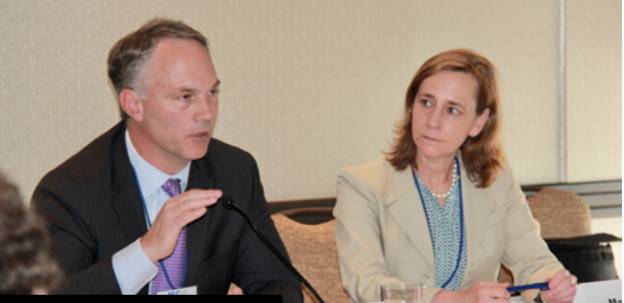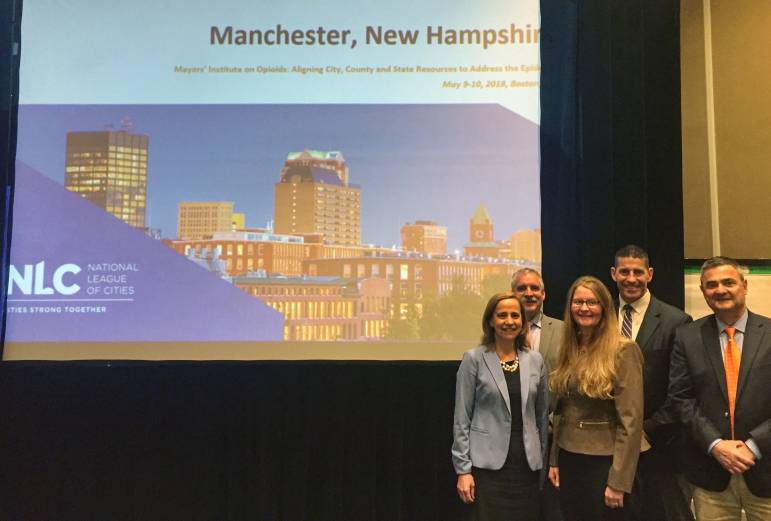City team heads to Nashville for second Mayors Institute on Opioids conference
This is the second gathering of city officials from around the country selected to participate in a year-long program that brings city leaders together for solutions-oriented discussions and peer-to-peer learning.


MANCHESTER, NH – A delegation from the city is heading to Nashville next week to continue work as part of the Mayors Institute on Opioids City Team Cohort Meeting, a national effort organized by National League of Cities to share best practices and help cities leverage resources to combat the devastation of addiction to families and local economies.
This is the second gathering of city officials from around the country selected to participate in a year-long program that brings city leaders together for solutions-oriented discussions and peer-to-peer learning.
Manchester was one of six cities from across the country chosen to participate earlier this year in May, along with mayors from Huntington, WV; Madison, WI; New Bedford, MA; Tacoma, WA; and this meeting’s host, Nashville, TN.
Mayor Craig said she’s looking forward to reconvening with the group for the three-day conference to continue the discussion. Since that first meeting, participants have participated in bimonthly conference calls in preparation for the follow-up meeting in Nashville.
“It’s great to learn from others and share the challenges we’re seeing in our city with mayors and their teams because they’re going through similar things,” Craig said. “It’s also useful to understand what approaches are in place elsewhere to potentially bring here.”
Based on feedback Craig said her fellow mayors have appreciated learning about Manchester’s approach, which includes innovating Safe Station.

Last meeting focused on presentations from each city around issues they’re experiencing followed by “deep-dive conversations” into each specific city, Craig said.
This time, members will provide quick updates, but the bulk of the time will be spent talking with experts in the field to consider ways to expand access and services as well as financing strategies.
“And another topic, applicable here, is on working with faith-based providers in our community to address the issue,” Craig said.
Craig said one of the revelations has been the affirmation that Manchester is not alone, as other cities are grappling with the crippling effects of addiction.
Although Manchester early on in the crisis gained a national reputation as ground zero to the crisis – even singled out as a “drug-infested den” by President Trump following the 2016 presidential election – Craig said Manchester’s most recent initiatives toward collaboration can provide a blueprint for others.
“I do believe Manchester is at forefront in combating this crisis, and the other participants did relay that message to me, specifically the Safe Station model. A lot of mayors and experts in the room were interested in how it works, how it’s funded and how we’ve been successful in bringing service providers and non-profits together,” Craig said. “That doesn’t always happen so nicely as it is happening in Manchester right now. I’mSo grateful for a community that really wants to work together to make sure people who need help most get it,” Craig said.
The cost of travel and lodging is completely covered by the National League of Cities (NLC). Although Manchester is not a member of NLC and pays no yearly dues to the organization, there are no costs to city for the mayor’s participation.
Also attending the meeting will be Manchester Fire Chief Dan Goonan; Jenny O’Higgins, Substance Use Disorder Continuum of Care Facilitator for Makin’ It Happen; and Lauren Smith, Policy and Strategic Outreach Director for the mayor. Public Health Director Anna Thomas is also part of the city’s team but was unable to travel to Nashville due to scheduling conflicts.
Stated Objectives of the Mayors’ Institute/National League of Cities
Along with the 12-month technical assistance effort that will follow, the Mayors Institute on Opioids City Team Cohort Meetings will enable participating mayors and their teams to obtain practical solutions and advice in response to their city’s specific circumstances and needs. Recommended strategies to improve outcomes related to the opioid epidemic will be identified and explored, including an emphasis on the effective use of data, innovative financing strategies and enhanced connections to how other systems can be leveraged to gain an upper hand on this growing epidemic. Learn more here.
- Leverage Recent Research and Innovations: The Mayors’ Institute will highlight emerging examples, based on the latest research and review of innovative models, of how other cities, counties and states are working to address the opioid crisis, with a focus on opportunities to strengthen coordination across systems.
- Learn from Philanthropic Organizations Supporting Efforts to Address the Opioid Epidemic: Mayors will be joined by leaders and experts from the nation’s leading philanthropic foundations to hear from them about innovations they are supporting.
- Facilitate Peer Learning: Immediately following the Mayors’ Institute, city teams will engage in applied learning experiences, including a site visit for a first-hand look at local innovations to address substance abuse, with an emphasis on opioids.
- Ensure Access to Additional Knowledge and Resources: Following the conclusion of the Mayors’ Institute, NLC and its partners will continue to connect participating cities to valuable resources, including tools and experts to accelerate local progress and further promote shared learning.
- Inform Future NLC Initiatives: Through their work and contributions to this project, mayors and other leaders will influence the focus and direction of future NLC efforts to spread and scale promising models, practices and policy approaches aimed at curbing the opioid and substance abuse epidemics facing our communities and the nation.




